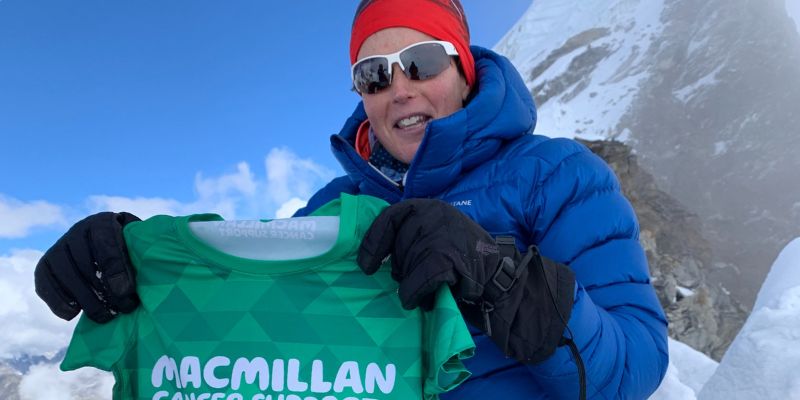
A cancer and exercise researcher at the University of Leeds has completed the world’s highest marathon and a 6000m mountain climb, just over a year on from her incurable breast cancer diagnosis.
With high altitude, cold temperatures and rough terrain, the Everest Marathon is a gruelling challenge that begins at more than 5000m above sea level. Dr Shaunna Burke celebrated completing the race on 29 May in aid of Macmillan Cancer Support.
Life doesn’t stop with an incurable cancer diagnosis.
Dr Burke has already raised £10,000 for the charity, which has previously funded her own research at the University of Leeds into the benefits of exercise before and after cancer surgery.
After dedicating her career to researching how exercise can be used in cancer treatment, Dr Burke was diagnosed with incurable, stage four breast cancer in 2024. Creating a personalised diet and exercise plan for herself, she ran to chemotherapy and radiotherapy appointments to maintain her fitness and mental health during cancer treatment.
What an inspirational achievement for Dr Shaunna, and what a powerful message to send to others going through a similar experience to her metastatic breast cancer diagnosis.
Dr Burke, an Associate Professor in Exercise and Health Psychology at the University of Leeds, said: “I don’t really have any words to describe the Everest Marathon. It was an unforgettable experience unlike anything I have ever done. No other event compares to running at high altitude in the foothills of the world’s tallest peaks—it was both humbling and exhilarating.
“I dedicated my run to all those who are living with an incurable cancer diagnosis. Every step I took was to honour those living with incurable cancer — not just as survivors, but as individuals who continue to live, to fight, and to thrive.
“For me, the run was about proving to myself that I can still set goals and push my limits — that life doesn’t stop with an incurable cancer diagnosis. I felt strong and unbelievably delighted to be part of a fantastic event.”
As well as completing the run, Dr Burke summited the nearby Loubouche East mountain, a peak more than 6000m above sea level. After this climb, Dr Burke questioned whether she could still do the run because of a stomach illness, but it all came together on the day.
Fiona Gavaghan, Macmillan Cancer Support Relationship Fundraising Manager said: "What an inspirational achievement for Dr Shaunna, and what a powerful message to send to others going through a similar experience to her metastatic breast cancer diagnosis.
"We are so proud that she has chosen us as her charity of choice and delighted that she has exceeded her donation target on top of all her other achievements.
“Looking forward to hearing all about the experience of running a marathon on Everest.
“For anyone impacted by cancer we are here to help; for information, support or just someone to talk to, call 0808 808 0000 or visit macmillan.org.uk/whateveryouneed.”
Her treatment involved four and a half months of chemotherapy, a double mastectomy, liver surgery, and 3 weeks of radiotherapy – delivered by Airedale Hospital and the Leeds Cancer Centre at St James’s Hospital, where Dr Burke saw the familiar faces of research colleagues in the radiotherapy wing. She is now taking maintenance therapy medication to control the cancer.
As a researcher in the School of Biomedical Sciences at Leeds, Dr Burke’s work focuses on prehabilitation and rehabilitation strategies designed to support patients before, during and after cancer treatment. This involves enhancing patients’ fitness levels both before and after surgery, enabling their bodies to better withstand the physical demands of treatment.
I dedicated my run to all those who are living with an incurable cancer diagnosis.
When asked how her diagnosis changed her perspective on her research, she said: “I thought I understood the participants in my research and what they were living through, but I didn’t. Now I completely understand.
“Moving forward, I would like to research new areas. Prehabilitation primarily focuses on getting patients fit for surgery, and the conversation tends to stop there. But what happens when patients face prolonged and multiple surgeries or treatments? This requires tailored support and a deep understanding of individual needs, so patients can maintain healthy lifestyles and preserve strength, function, and overall well-being throughout their treatments and beyond.”
Dr Burke’s projects, which have been supported by funders including Macmillan, Yorkshire Cancer Research and Cancer Research UK, have shown that people should keep as active as possible before and during treatment to aid recovery.
Dr Burke became the second Canadian woman to summit Everest in 2005 and since then, she has also researched the psychology of mountaineering, and the preparation needed for a huge climb like Everest.
While in Nepal, Dr Burke has also been exploring potential research collaborations in the region with local communities to help them access pre- and re-habilitation remotely through telemedicine.
You can follow Dr Burke’s Everest Marathon journey on Instagram.
Further information
For more information, please contact Mia Saunders in the University of Leeds press office on m.saunders@leeds.ac.uk.